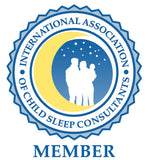Evidence-Based Research
All our Sleep Programs and methods are very carefully researched, analysed and endorsed according to the most up-to-date information, which has been proven with over 800,000 babies and toddlers worldwide.
Little Ones is a Platinum Training Provider for our extensive internationally registered training programme.
Little Ones is accredited by the IACSC (International Association of Child Sleep Consultants) and we are endorsed and recommended by Dr Kate Johnson, Ph.D. in neurophysiology and postdoctoral fellow in the Department of Sleep Medicine at Harvard Medical School and Stanford Research International.

Our references are:
Nakagawa, M. et al. Daytime nap controls toddlers’ nighttime sleep. Sci. Rep. 6, 27246; doi: 10.1038/srep27246 (2016).
Gradisar M, Jackson K, Spurrier N, Gibson J, Whitham J, Williams A.S, Dolby R, Kennaway DJ. Behavioral Interventions for Infant Sleep Problems: A Randomized Controlled Trial http://pediatrics.aappublications.org/content/early/2016/05/21/peds.2015-1486
Hall WA, Moynihan M, Bhagat R, Wooldridge J. Relationships between parental sleep quality, fatigue, cognitions about infant sleep, and parental depression pre and post-intervention for infant behavioral sleep problems. BMC Pregnancy Childbirth. 2017 Apr 4;17(1):104. doi: 10.1186/s12884-017-1284-x. PubMed PMID: 28376726; PubMed Central PMCID: PMC5379718.
Iwata S, Fujita F, Kinoshita M, Unno M, Horinouchi T, Morokuma S, Iwata O. Dependence of nighttime sleep duration in one-month-old infants on alterations in natural and artificial photoperiod. Sci Rep. 2017 Mar 17;7:44749. doi: 10.1038/srep44749. PubMed PMID: 28303945; PubMed Central PMCID: PMC5355994.
Symon B, Crichton GE. The joy of parenting: infant sleep intervention to improve maternal emotional well-being and infant sleep. Singapore Med J. 2017 Jan;58(1):50-54. doi: 10.11622/smedj.2016046. Epub 2016 Feb 26. PubMed PMID: 26915392; PubMed Central PMCID: PMC5331130.
Paul IM, Savage JS, Anzman-Frasca S, Marini ME, Mindell JA, Birch LL. INSIGHT Responsive Parenting Intervention and Infant Sleep. Pediatrics. 2016 Jul;138(1). pii: e20160762. doi: 10.1542/peds.2016-0762. PubMed PMID: 27354460; PubMed Central PMCID: PMC4925087.
Sharkey KM, Iko IN, Machan JT, Thompson-Westra J, Pearlstein TB. Infant sleep and feeding patterns are associated with maternal sleep, stress, and depressed mood in women with a history of major depressive disorder (MDD). Arch Womens Ment Health. 2016 Apr;19(2):209-18. doi: 10.1007/s00737-015-0557-5. Epub 2015 Aug 1. PubMed PMID: 26228760; PubMed Central PMCID: PMC4781668
Kaczor M, Skalski M. Treatment of behavioral sleep problems in children and adolescents - literature review. Psychiatr Pol. 2016;50(3):571-84. doi: 10.12740/PP/41294. Review. English, Polish. PubMed PMID: 27556115.
Hannan K, Hiscock H. Sleep problems in children. Aust Fam Physician. 2015 Dec;44(12):880-3. PubMed PMID: 27054204.
St James-Roberts I, Roberts M, Hovish K, Owen C. Video Evidence That Infants Can Resettle Themselves Back to Sleep After Waking in the Night, as well as Sleep for Long Periods, by 3 Months of Age. J Dev Behav Pediatr. 2015 Jun;36(5):324-9. doi: 10.1097/DBP.0000000000000166. PubMed PMID: 26035139; PubMed Central PMCID: PMC4459553.
Mindell JA, Li AM, Sadeh A, Kwon R, Goh DY. Bedtime routines for young children: a dose-dependent association with sleep outcomes. Sleep. 2015 May 1;38(5):717-22. doi: 10.5665/sleep.4662. PubMed PMID: 25325483; PubMed Central PMCID: PMC4402657.
Mindell JA, Du Mond CE, Sadeh A, Telofski LS, Kulkarni N, Gunn E. Efficacy of an internet-based intervention for infant and toddler sleep disturbances. Sleep. 2011 Apr 1;34(4):451-8. PubMed PMID: 21461323; PubMed Central PMCID: PMC3065255.
Coons S, Guilleminault C. Development of consolidated sleep and wakeful periods in relation to the day/night cycle in infancy. Dev Med Child Neurol. 1984 Apr;26(2):169-76. PubMed PMID: 6724155.
Coons S, Guilleminault C. Development of sleep-wake patterns and non-rapid eye movement sleep stages during the first six months of life in normal infants. Pediatrics. 1982 Jun;69(6):793-8. PubMed PMID: 7079046.
Dewar, G. (2008-2014). Baby sleep patterns: A guide for the science-minded. Retrieved from Parenting Science: http:// www.parentingscience.com/baby-sleep-patterns.html
Tauman, R., Levine, A., Avni, H., Nehama, H., Greenfeld, M., and Sivan, Y. (2011). Coexistence of sleep and feeding disturbances in young children. Pediatrics. 127(3) Retrieved from http://www.parentingscience.com/baby-
sleep- deprivation.html
Asok A, Bernard K, Roth TL, Rosen JB, and Dozier M. (2013). Parental responsiveness moderates the association between early-life stress and reduced telomere length. Dev Psychopathol. 25(3):577-85. Retrieved from http://www.parentingscience.com/stress-in-babies
Small, M. F (1998). Our Babies, Ourselves: how biology and culture shape the way we parent. Random House: Anchor Books.
Shonkoff, J.P. and A.S. Garner. The lifelong effects of early childhood adversity and toxic stress. Pediatrics. 129(1): p. e232-46. 2012.
de Weerth, C., R.H. Zijl, and J.K. Buitelaar. Development of cortisol circadian rhythm in infancy. Early Hum Dev. 73(1-2): p. 39-52. 2003.
Gunnar, M.R. and B. Donzella. Social regulation of the cortisol levels in early human development. Psychoneuroendocrinology. 27(1-2): p. 199-220. 2002.
Middlemiss, W., D.A. Granger, W.A. Goldberg, and L. Nathans. Asynchrony of mother-infant hypothalamic-pituitary-adrenal axis activity following extinction of infant crying responses induced during the transition to sleep. Early Hum Dev. 88(4): p. 227-32. 2012.
Gunnar, M.R., N.M. Talge, and A. Herrera. Stressor paradigms in developmental studies: what does and does not work to produce mean increases in salivary cortisol. Psychoneuroendocrinology. 34(7): p. 953-67. 2009.
Ahnert, L., M.R. Gunnar, M.E. Lamb, and M. Barthel. Transition to child care: associations with infant-mother attachment, infant negative emotion, and cortisol elevations. Child Dev. 75(3): p. 639-50. 2004.
Vermeer, H.J. and M.H. van IJzendoorn. Children’s elevated cortisol levels at daycare: A review and meta-analysis. Early Childhood Research Quarterly. 21: p. 390-401. 2006
Scher, A., W.A. Hall, A. Zaidman-Zait, and J. Weinberg. Sleep quality, cortisol levels, and behavioral regulation in toddlers. Dev Psychobiol. 52(1): p. 44-53. 2010.
Karraker, K.H. and M. Young. Night Waking in 6-Month-Old Infants and Maternal Depressive Symptoms. J Appl Dev Psychol. 28(5-6): p. 493-498. 2007.
Spangler, G., M. Schieche, U. Ilg, U. Maier, and C. Ackermann. Maternal sensitivity as an external organizer for biobehavioral regulation in infancy. Dev Psychobiol. 27(7): p. 425-37. 1994.
To get started on better sleep with our trusted Sleep Programs, click here!



